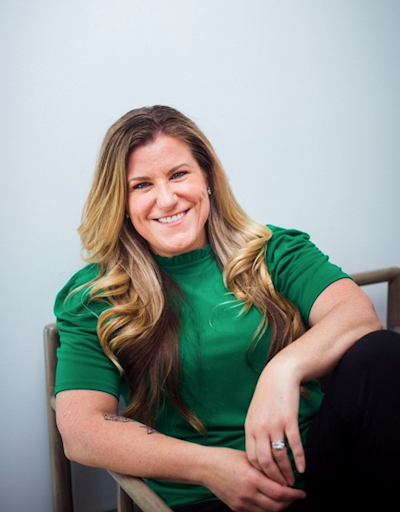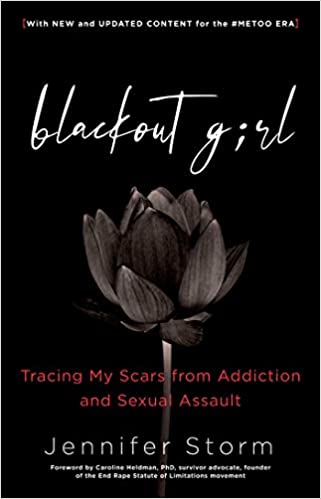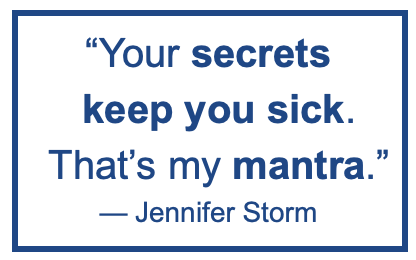Jennifer Storm is an award winning victims’ rights expert, survivor of sexual violence and addiction, advocate, and best-selling author on trauma and addiction.

She has served as Victim Witness Advocate of the Commonwealth of Pennsylvania since her appointment by Gov. Tom Corbett in 2013.
Her book, Blackout Girl: Tracing My Scars from Addiction and Sexual Assault; With New and Updated Content for the #MeToo Era, tells her story of surviving sexual violence and the effects it had on the mental health struggles and addiction she experienced.
RAINN’s Christy Rozek sat down with Jennifer (virtually) to discuss her journey of abuse, addiction, and healing, her practical advice for others experiencing similar struggles, and what our communities need to do to ensure we are holistically serving those who experience trauma and addiction.
This interview has been condensed and edited for clarity.
Was it difficult to start talking about this when you originally wrote Blackout Girl: Growing Up and Drying Out in America in 2007?
I started writing when I first got sober. I survived a suicide attempt and the only place I trusted myself was on paper. I was only writing for personal healing at that point.
When I applied to Penn State University as an adult student, I felt that I had to share why my educational history was horrific—I had spent my youth so entrenched in trauma and addiction, I couldn’t show up for school. That was the first time I shared my story in writing.
When I moved through college and activism work, I started thinking about writing for audiences. I first shared my story of being raped at a Take Back the Night event on campus in 2000. I just shared from my heart and started to appreciate how liberating telling my story was. I felt lighter after I did it. That feeling became such a significant part of my healing.
What do you see as the major connections between sexual trauma and addiction?
As I started to move through my journey, I began connecting the dots between trauma and substance use disorder. There aren’t enough people talking about this. I felt that I had to share my story so others could see an example of what healing looks like and that there is a path forward.
I see a connection with that and why we’ve seen the suicide rate, alcoholism, substance use disorder, and overdose rate spikes among women. In recent years, the number of women dying of alcoholism has greatly increased, and I see the often never addressed history of sexal violence for so many as a huge part of this.
My experience with addiction is strongly linked with being raped as a child. If I had been able to access services, to get help without shame, maybe things could have been different for me.
It’s dark, but it’s real—if we’re not talking to young people about how to deal with trauma, stress, and anxiety, we’re putting them at risk for addiction.
How has writing become part of your healing journey?

Writing has healed part of me that I didn’t even realize needed healing. Writing is my strongest healing mechanism. Writing helps me know what’s going on in my head, organize my thoughts, understand what’s going on, and develop a plan to address it. I write every day—often just in the notes section of my phone—I always find a way to get the words out.
What would you say to those out there who want to write but don’t know how to get started?
I wasn’t a professional writer, I was a nobody. I had a GPA of 1.3. You don’t have to be a polished scholastic writer to write. For me, I’m a very stream of consciousness writer. I’ve learned over 20 years how to be a better writer by just doing it.
How to write? You start. Start putting one word next to another on a piece of paper. Just dump the contents of your head out. At a later point, if you want to share your writing in a public way, you can edit it.
What was the number one thing that helped you heal from addiction and find healthy coping mechanisms for the trauma you experienced?

The most important thing for me on a daily basis is the understanding that my secrets will keep me sick. I learned this early on and it was the reason I started to dig into my past. If I look at my life, everything changed when I was raped. I had to go all the way back to that place in order to heal that wound.
I have a combination of tools that help every day: first and foremost, you have to know yourself. I had to learn who I was, I had to accept what happened to me, then identify my reactions and responses and triggers around those things.
As an expert in this field, what are some patterns that persist in sexual violence and its effects on mental health, abuse, and addiction?
We’re still far too siloed in how we approach healing and support. There are resources for survivors and there are addiction treatment services. But these are too often separated. It’s almost impossible to find trauma-informed facilities that treated sexual violence as a cause of addiction. We still lack accessible, proper, trauma-informed services for those experiencing addiction after sexual violence.
I saw this first-hand when I tried to get help. There weren’t any spaces where I could talk about rape being the cause of my addiction and that would provide addiction treatment from a trauma-informed perspective. They were seen as unrelated. The system is not built to deal with it.
Band aid on a bullet wound—that’s what we’ve done in the treatment field for decades for sexual assault survivors. We don’t want to deal with their trauma, so we provide treatment for addiction but not for the underlying cause. And if you don’t get support and address trauma, you do what it takes to survive day to day and handle the pain. For years, that meant alcohol and crack cocaine addiction.
Many survivors of sexual violence talk about the shame and self-blame they experience because of what happened. How does this tie-in with substance use?
Oh, I have a whole chapter on shame—the shame spiral. I would start feeling guilty and shameful about what happened to me or because of something I did as part of my addiction. The shame would spin me right back into my bad negative coping mechanism.
It helped me so much to learn that shame is a biological response to trauma. No wonder it was so hard for me to rewire that! That knowledge granted me freedom to really alleviate that shame, to realize that the shame is not mine. When I know that it’s a response I have, I can work to create a different response for myself.
Letting go of what happened is a huge part of healing. Allow yourself the freedom to put down that stick you’ve been beating yourself up with. You’re human, you’re having a normal response to an abnormal thing that happened to you.
What is the biggest misconception about addiction and recovery?
The biggest misconceptions are that you can never trust an addict, relapse is inevitable, and they will never be able to live a life free of substances.
If someone does relapse, it’s not the end. It just means that there’s still work for them to do. It’s a process; it takes time. Be compassionate with people, and hold them accountable. There is hope.
How can family and friends support someone who is experiencing addiction after sexual trauma?
Sometimes our family and friends just don’t know how to respond. When someone does make a mistake or have a relapse, don’t layer on the shame and guilt. It will only harm them. Instead a trauma-informed response could be saying, “I’m sorry, I understand this is a struggle. It’s a process, and I want to understand how I can help you make a different choice next time.”
There’s a space between tough love and enabling, and it’s called compassionate accountability. Responding in a way that shows care, love, and support, and also says here are tools, now go use them.
You can’t fix your loved one. It’s impossible. You have to let that go. What you can do is plant the seeds of hope, resources, and compassion.
Provide as much hope and resources as you can. Then step away, take care of yourself, and set healthy boundaries.
What advice you would give to someone out there struggling with addiction and healing from sexual violence?
My feelings are what drove me to using. I didn’t know how to identify them; I didn’t even know what they were. I had these upheavals inside of me that made me try to do things to feel better. It helped me to name what those emotions were and where they came from.
Whether we are homebound during a pandemic and your only access is your phone, there are so many who care about you. There are so many resources out there waiting to help you heal. You are not alone. You never have to go through this alone.